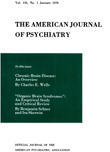Tardive dyskinesia: summary of a Task Force Report of the American Psychiatric Association. By the Task Force on Late Neurological Effects of Antipsychotic Drugs
Abstract
Abnormal movements associated with the prolonged use of antipsychotic drugs (tardive dyskinesia) occur in at least 10%-20% of the patients at risk; prevalence is higher among the elderly. The casue is unknown, but increased sensitivity to dopamine in the basal ganglia may contribute to the pathophysiology. Many treatments have been evaluated; none is satisfactory. While the problem is serious, an alarmist view is unwarranted, especially since many cases are detected early and improve spontaneously. The best approach currently is to use antipsychotic drugs thoughtfully for clear indications, the best supported of which, scientifically, is chronic schizophrenia. There is a search for new agents with much less adverse neurologic effect but with adequate antipsychotic efficacy. This article summarizes an APA Task Force Report.
Access content
To read the fulltext, please use one of the options below to sign in or purchase access.- Personal login
- Institutional Login
- Sign in via OpenAthens
- Register for access
-
Please login/register if you wish to pair your device and check access availability.
Not a subscriber?
PsychiatryOnline subscription options offer access to the DSM-5 library, books, journals, CME, and patient resources. This all-in-one virtual library provides psychiatrists and mental health professionals with key resources for diagnosis, treatment, research, and professional development.
Need more help? PsychiatryOnline Customer Service may be reached by emailing [email protected] or by calling 800-368-5777 (in the U.S.) or 703-907-7322 (outside the U.S.).



